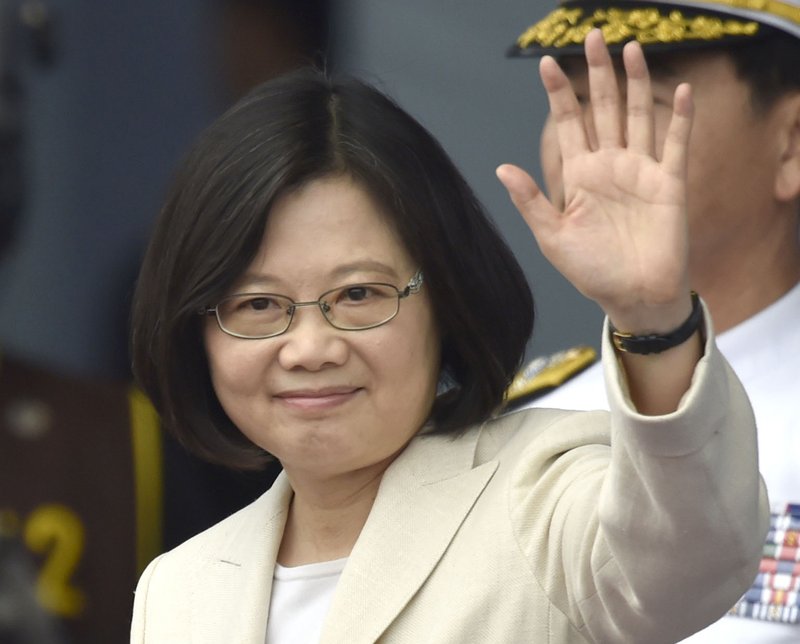BEIJING -- Beijing said Saturday that it had cut off contact with the main liaison body of Taiwan because of the refusal of its president, Tsai Ing-wen, to endorse the concept of a single Chinese nation, ratcheting up pressure on the new Taiwanese leader.
In a statement posted on the website of the Chinese Cabinet's Taiwan Affairs Office, spokesman An Fengshan said contacts between bodies responsible for ties had been suspended starting from Tsai's May 20 inauguration.
"Because the Taiwan side has been unable to confirm the '92 consensus that embodies the common political foundation of the one-China principle, the mechanism for contact and communication between the two sides has already been suspended," the statement quoted An as saying.
The 1992 consensus refers to an arrangement made that year under which both sides acknowledged the existence of a single Chinese nation comprising both Taiwan and the mainland. That understanding underpinned dialogue between the sides that allowed them to build ties and partially overcome enmity stemming from their bitter split amid the Chinese civil war in 1949. Tsai has neither formally endorsed nor repudiated the construct.
The island hopes to have more communications channels with China that "will help the interactions and development in relations," Tung Chen-yuan, a Taiwan Cabinet spokesman, said by phone Saturday.
The Chinese statement came after Taiwan protested Cambodia's deportation of 25 Taiwanese Internet-scam suspects to China.
The 25 Taiwanese and 14 Chinese were deported on a special plane dispatched Friday by the Chinese government, said Gen. Ouk Haiseila, the chief of the Cambodian Interior Ministry's Immigration Investigation Bureau.
Haiseila said they were sent to China because they had committed crimes against Chinese citizens. They are accused of defrauding victims in China using phone calls made over the Internet, which complicated tracing them. Cambodia also regards Taiwan to be part of China.
Rights activists and Taiwanese authorities said such deportations reflect the great influence China exercises over Cambodia through aid and investment.
The Taiwanese Foreign Ministry said it had lodged formal protests with Cambodia and expressed "deep regrets" over the deportation. Kenya and Malaysia have also deported Taiwanese Internet-scam suspects to China despite protests by Taiwanese officials.
Although China says Taiwan has been part of its territory since ancient times, the sides have been unified only for four of the past 120 years. Taiwan functions as an independent country and does not acknowledge Beijing's claim of authority over it.
The island's political relations with the mainland have become increasingly strained since January's landslide election victory by Tsai, leader of Taiwan's independence-leaning Democratic Progressive Party. The economic effects of the tensions are starting to be felt by Taiwan, with Chinese tourist groups in May falling 32 percent from a year earlier to 128,999 people.
Tsai, meanwhile, departed Friday on her first overseas trip since taking office last month, amid speculation that China may seek to tighten its diplomatic stranglehold over the island.
Tsai left for separate visits to allies Panama and Paraguay, stopping in Miami on the way out and in Los Angeles on the way home. She is to attend the formal opening of new ship locks on the Panama Canal before delivering a speech to Paraguay's parliament on Tuesday.
Taiwan has formal diplomatic relations with just 22 nations as a result of Chinese-imposed isolation. Most allies are in Central America, the Caribbean, Africa and the South Pacific.
China in March established formal diplomatic ties with the small African nation of Gambia, which had severed relations with Taiwan in 2013. That was seen as a move toward abandoning the unspoken diplomatic truce between the sides that lasted for eight years under Tsai's China-friendly predecessor.
Information for this article was contributed by Christopher Bodeen and staff members of The Associated Press and by Yu-Huay Sun of Bloomberg News.
A Section on 06/26/2016
